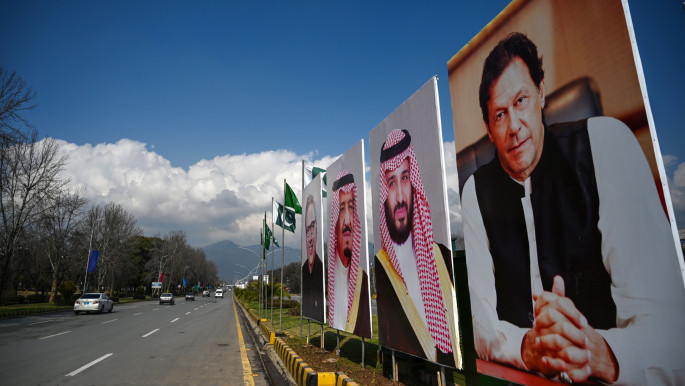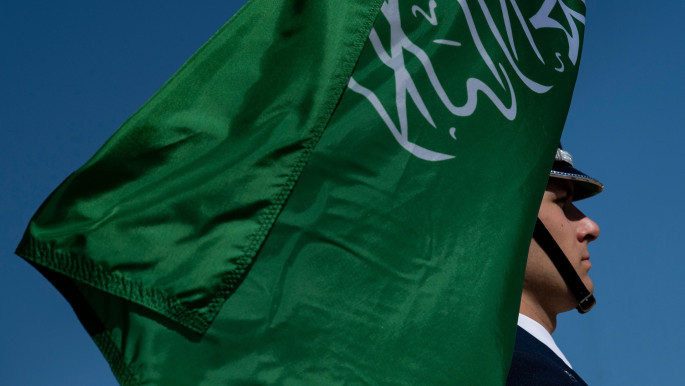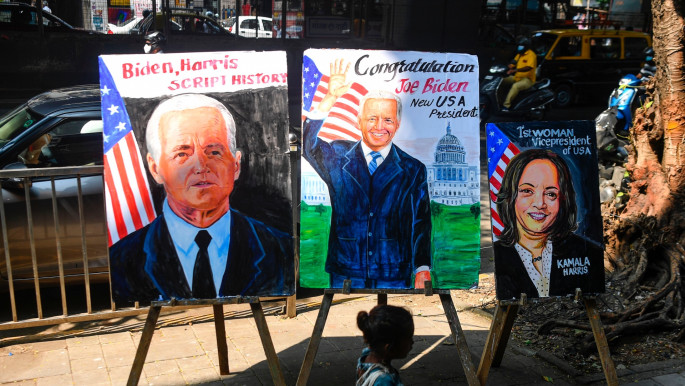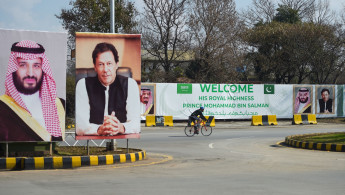Can Saudi Arabia and Pakistan mend frayed ties?
During their first telephone conversation in two months, Saudi Crown Prince Mohammed bin Salman in late March invited Pakistan's Prime Minister Imran Khan to visit the Kingdom, with the Pakistani leader accepting the offer.
Pakistani Foreign Minister Shah Mehmood Qureshi, meanwhile, visited Egypt earlier this year to establish stronger trade ties and discuss investment opportunities. Since Cairo is perceived to be a close Saudi ally, it is likely a sign that Riyadh and Islamabad are back on the same page.
Most significantly, Riyadh has also withdrawn its request for Pakistan to repay the third instalment of a $3 billion loan. Last year, as bilateral ties frayed, Saudi Arabia had on short notice demanded that Islamabad make an early repayment of the money, which was part of a $6 billion financial bailout package.
Misunderstandings between both countries began in August 2019 when India abrogated Article 370 and removed the special status of the disputed part of Kashmir under its control. Pakistan was disappointed with the response of the Riyadh-led Organisation for Islamic Cooperation (OIC) on the matter and founded a new Muslim bloc along with Turkey, Malaysia, Iran and Qatar.
 |
The 'reset' with Pakistan is coming at a moment when Saudi Arabia will have to position itself better in geopolitical terms vis-a-vis Iran and China during the tenure of the new US president |  |
Due to pressure from Riyadh, Pakistan's PM Imran Khan did not attend the first summit of the new forum. Six months later, however, the Pakistani FM demanded that the OIC hold a foreign ministers' meeting to discuss Kashmir, or Islamabad would have to look beyond the Arab state for support. Soon after this, Riyadh demanded back its loan repayment. Now, Saudi Arabia and Pakistan's relations are improving, but the reason seems to be Riyadh's changing ties with other countries.
 |
|
| Read more: Could Saudi Arabia be parting ways with Pakistan? |
Ever since the Biden administration came to power, Riyadh has been under pressure to implement human rights reforms. Soon after, a declassified US intelligence report into the murder of journalist Jamal Khashoggi asserted that the Saudi crown prince was complicit.
At this sensitive time, Riyadh received Islamabad's complete support for the Saudi leadership. Endorsing the Kingdom's stance on the matter, Pakistan's Ministry of Foreign Affairs expressed solidarity, saying, "The Saudi government has further underlined that it took all possible measures within its legal system to ensure that the individuals responsible were properly investigated, convicted, sentenced, and that justice was served".
Another factor is Iran. Chinese Foreign Minister Wang Yi recently finalised a long-awaited 25-year strategic partnership deal with Tehran during a recent tour of the Middle East. In addition, Washington is getting closer to reaching an understanding over the Joint Comprehensive Plan of Action (JCPOA) nuclear deal. If this happens, Iran will reap benefits from both China and the US, as well as loosened economic restrictions.
 |
Saudi Arabia and Pakistan's relations are improving, but the reason seems to be Riyadh's changing ties with other countries |  |
"The 'reset' [with Pakistan] is coming at a moment when Saudi Arabia will have to position itself better in geopolitical terms vis-a-vis Iran and China during the tenure of the new US president," Lukasz Przybyszewski, West Asia analyst for the Asia Research Centre at Warsaw's War Studies Academy, told The New Arab. "The prospect of a reconstitution of the JCPOA is pressing Riyadh to be ready to discourage any deeper Iran-Pakistan convergence of economic interests."
Indeed, Riyadh has shown renewed interest in building a $10 billion Aramco refinery and petrochemicals 'oil-city' on 88,000 acres of land in Gwadar on the southwestern coast of Balochistan. Saudi Arabia seemingly wants to retain influence in Pakistan, which also happens to have the second-largest Shia population in the world after Iran.
Furthermore, Riyadh has also upgraded ties with Beijing. The Chinese FM visited the Kingdom in March and a Sino-Saudi comprehensive strategic partnership was discussed, along with a free trade agreement. Both sides agreed to bring their business engagement further in line with Saudi Arabia's Vision 2030 blueprint.
Beijing has close ties with Islamabad and the flagship corridor of China's Belt and Road Initiative (BRI) passes through Pakistan. Even Saudi Arabia is an important BRI country and China can easily mediate misunderstandings between Riyadh and Islamabad.
 |
|
| Reset or rupture: What lies in store for US-Saudi ties? |
Notably, though Indo-Saudi ties have been on an upward trajectory in recent years, there is one glitch. According to an International Energy Agency report, India will be the biggest energy consuming market from now until 2040. Showing its clout, New Delhi decided to reduce dependence on the Middle East as the Organisation of Oil Exporting Countries and Major Producers (OPEC+) sought to maintain production cuts.
Planning to cut imports from Saudi Arabia by a quarter from this May, India will acquire 10.8 million barrels instead of the monthly average of 14.7-14.8 million. Recently, Saudi Energy Minister Prince Abdulaziz bin Salman acknowledged that the production cuts put Aramco "in some difficulty with some of its partners."
Such developments could reduce the influence of big producers like Saudi Arabia and make Riyadh more likely to try and balance ties with both India with Pakistan. According to the consultancy Eurasia, "Until recently, the balance of power was skewed towards Saudi Arabia, but increasingly, India is using access to its market and the diversity of options to put pressure on Saudi Arabia. For Saudi Arabia, losing market share in a global environment in which most developed economies are already seeing their oil demand decline due to green policy implementation, would be a blow."
 |
Security and military aspects are at the foundation of the ties between KSA and Pakistan, thus they will still be the key driver in any future calculations |  |
Another important factor is defence. The recalibration of the US-Saudi relationship is continuing, and Washington has recently pulled three Patriot missile batteries out of Saudi Arabia, leaving it without an air defence shield. From Riyadh's point of view, this move can only benefit Iran.
Apparently, the Biden administration may also be ending the permanent deployment of an aircraft carrier in the region. It is unclear how Riyadh plans to solve this security issue, but it may need Islamabad for moral support.
 |
|
| Read more: Will the Biden-Harris administration stand up to Modi on Kashmir? |
"Security and military aspects are at the foundation of the ties between KSA and Pakistan, thus they will still be the key driver in any future calculations," Przybyszewski told The New Arab.
"Yet Riyadh will have no interest in supporting Islamabad on any other issues than those regarding Iran and Afghanistan and Saudi Arabia's own domestic security needs," he added.
"Aside from that, KSA has little geopolitically motivated necessity to resort to other levels of cooperation with Pakistan in terms of security and military other than tactically, because the main strategic partners for balancing Riyadh's relations with Beijing will be India and the US".
Bilateral ties, therefore, are unlikely to return to what the Saudi ex-intelligence head, Prince Turki bin Faisal, once described as "one of the closest relationships in the world between any two countries without any official treaty". After a stagnant phase, Saudi Arabia and Pakistan's relations are evolving according to new geopolitical shifts and realignments in the region.
"From a realistic point of view, relations between Pakistan and Saudi Arabia were not in crisis last year but undergoing intensive rearrangement," Przybyszewski said. "2020 was just another milestone after about a decade of drifting apart in strategic terms. Riyadh's moves last year allowed Islamabad to confidently proceed with rebalancing its foreign political and economic relations."
Sabena Siddiqui is a foreign affairs journalist, lawyer and geopolitical analyst specialising in modern China, the Belt and Road Initiative, Middle East and South Asia.
Follow her on Twitter: @sabena_siddiqi



